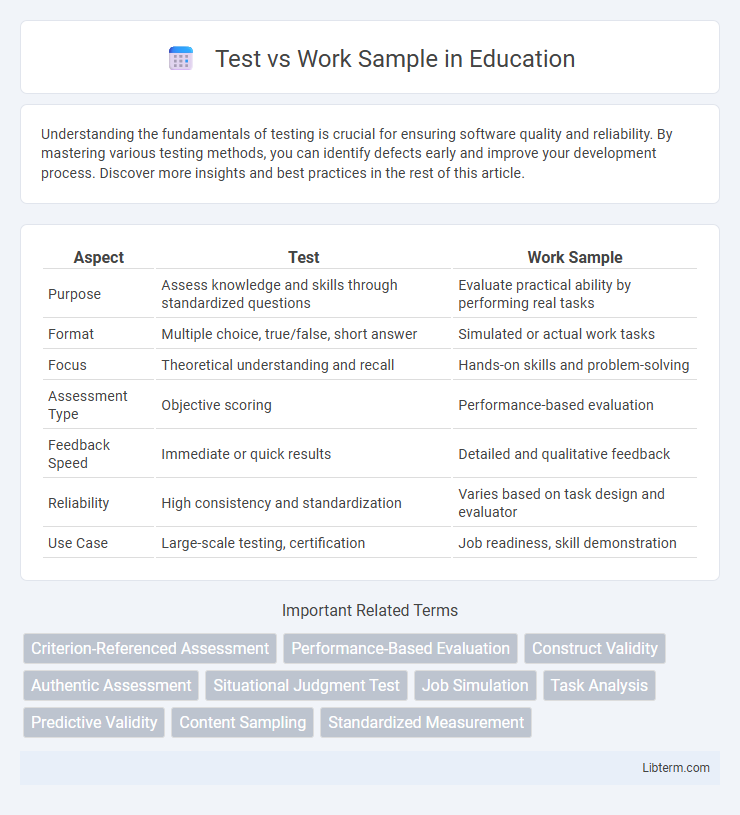Understanding the fundamentals of testing is crucial for ensuring software quality and reliability. By mastering various testing methods, you can identify defects early and improve your development process. Discover more insights and best practices in the rest of this article.
Table of Comparison
| Aspect | Test | Work Sample |
|---|---|---|
| Purpose | Assess knowledge and skills through standardized questions | Evaluate practical ability by performing real tasks |
| Format | Multiple choice, true/false, short answer | Simulated or actual work tasks |
| Focus | Theoretical understanding and recall | Hands-on skills and problem-solving |
| Assessment Type | Objective scoring | Performance-based evaluation |
| Feedback Speed | Immediate or quick results | Detailed and qualitative feedback |
| Reliability | High consistency and standardization | Varies based on task design and evaluator |
| Use Case | Large-scale testing, certification | Job readiness, skill demonstration |
Understanding Tests and Work Samples
Tests evaluate specific knowledge or skills using standardized questions or tasks, providing measurable and comparable results across candidates. Work samples simulate actual job tasks, allowing candidates to demonstrate their practical abilities and problem-solving skills in a realistic context. Understanding the distinctions helps employers choose appropriate assessment tools to predict job performance effectively.
Key Differences Between Tests and Work Samples
Tests primarily measure theoretical knowledge or cognitive abilities through standardized questions, while work samples evaluate practical skills by requiring candidates to perform actual job-related tasks. Tests offer quick quantifiable results but may lack real-world applicability, whereas work samples provide direct evidence of job performance and skill competency. The key difference lies in the focus: tests assess potential or aptitude, and work samples assess demonstrated capability.
Purpose and Objectives of Tests
Tests primarily aim to measure knowledge, skills, or abilities through structured, standardized questions designed to evaluate competency or aptitude across specific domains. Work samples focus on assessing actual job performance by requiring candidates to complete tasks that closely replicate real-world work scenarios, providing practical insight into their capabilities. The purpose of tests centers on broad evaluation and comparison, while work samples target direct demonstration of relevant skills and problem-solving in context.
Purpose and Objectives of Work Samples
Work samples are designed to directly evaluate a candidate's ability to perform specific job-related tasks by simulating real work scenarios, providing a practical demonstration of skills and competencies. The primary objective is to assess how well an individual can apply knowledge, technical skills, and problem-solving abilities in situations closely aligned with actual job duties. Unlike traditional tests, work samples focus on performance outcomes to predict future job success more accurately.
Advantages of Using Tests in Hiring
Tests in hiring provide objective and standardized evaluation of candidates' skills and knowledge, reducing biases compared to subjective assessments. They enable employers to measure specific job-related competencies efficiently, ensuring better alignment with role requirements. Implementing tests can streamline the selection process by quickly identifying top performers, saving time and resources.
Benefits of Implementing Work Samples
Implementing work samples in the hiring process provides a practical evaluation of a candidate's skills through real-world tasks, enhancing the accuracy of job fit assessments. These samples reduce the risk of hiring errors by showcasing actual performance rather than relying solely on theoretical knowledge or interviews. Employers benefit from increased productivity and reduced turnover by selecting candidates who demonstrate proven capabilities relevant to the specific job requirements.
Limitations of Tests in Candidate Evaluation
Tests in candidate evaluation often fail to capture real-world job performance, limiting insights into practical skills and adaptability. They can be biased by cultural, educational, or socioeconomic factors, affecting fairness and accuracy. Moreover, tests typically overlook soft skills such as communication and teamwork, which are crucial for workplace success.
Challenges of Using Work Samples
Work samples present challenges such as requiring significant time and resources to develop, administer, and evaluate effectively. They may introduce bias if the tasks do not accurately represent job conditions or fail to account for diverse candidate backgrounds. Ensuring consistency and fairness across candidates can be difficult, limiting the scalability of work sample assessments compared to standardized tests.
Choosing Between Tests and Work Samples
Tests offer standardized evaluation of skills and cognitive abilities, providing quantifiable data for comparing candidates. Work samples demonstrate real-world task performance, showcasing practical competence and problem-solving in relevant job contexts. Selecting between tests and work samples depends on the job's complexity, desired skills, and the need for predictive validity in hiring decisions.
Best Practices for Effective Assessment
Work sample assessments demonstrate job-relevant skills through realistic tasks, enhancing predictive validity over traditional tests. Best practices include aligning work samples with critical job functions, ensuring standardized scoring rubrics, and providing clear instructions to reduce candidate anxiety. Incorporating multiple raters and feedback mechanisms further improves reliability and candidate experience during the assessment process.
Test Infographic

 libterm.com
libterm.com